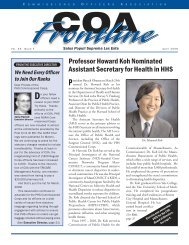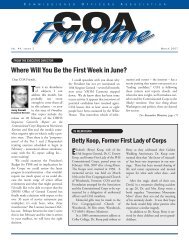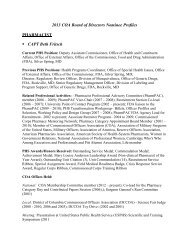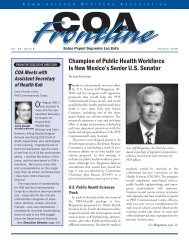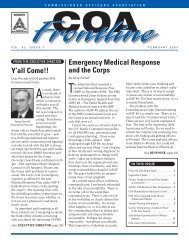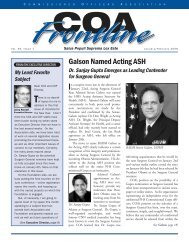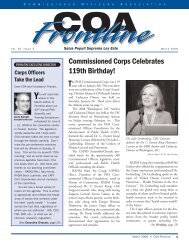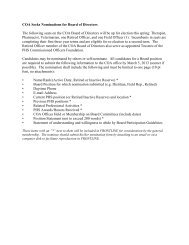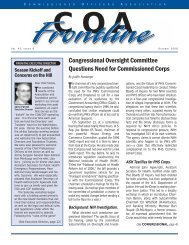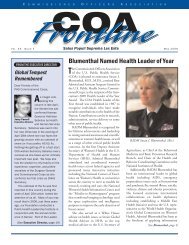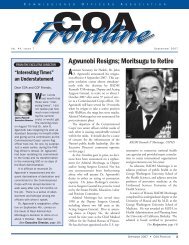rutstein retirement sends shock waves throughout the commissioned
rutstein retirement sends shock waves throughout the commissioned
rutstein retirement sends shock waves throughout the commissioned
Create successful ePaper yourself
Turn your PDF publications into a flip-book with our unique Google optimized e-Paper software.
FROM THE EXECUTIVE DIRECTOR continued...<br />
The points made by Dr. Koh are contained<br />
in <strong>the</strong> “Executive Summary”<br />
slides made available to all Corps<br />
officers on <strong>the</strong> CCMIS website and<br />
announced in an email to <strong>the</strong> Corps<br />
just as our telephone call was ending<br />
at 4:35PM on <strong>the</strong> 12th. For those unable<br />
to access <strong>the</strong> password protected<br />
CCMIS webpage, we have posted <strong>the</strong><br />
briefing notes on <strong>the</strong> COA website.<br />
Dr. Koh reported on <strong>the</strong> Office of<br />
Management and Budget (OMB) tasking<br />
for a management review, <strong>the</strong> process<br />
and players he directed to conduct<br />
that review, and <strong>the</strong> “findings” and 46<br />
recommendations developed by <strong>the</strong> review.<br />
The findings concluded by <strong>the</strong> review<br />
validate COA’s concerns expressed<br />
to Dr. Koh during that first meeting<br />
with him in March, 2009. The management<br />
review found a decentralized<br />
and complex organizational structure;<br />
operations spread across three different<br />
chains of command (actually more if<br />
you include <strong>the</strong> opdivs and agencies);<br />
fragmented and inconsistent enforcement<br />
of policies; “suboptimal” customer<br />
satisfaction; and more.<br />
Dr. Koh told me that he was taking immediate<br />
steps to address <strong>the</strong> key items.<br />
Among <strong>the</strong>se first steps are streamlining<br />
<strong>the</strong> Corps’ administrative structure<br />
from 20 to 10 offices; unifying policy<br />
and operations under a single point<br />
of accountability (realigning OCCFM<br />
back under OSG); and establishing an<br />
advisory board to assist <strong>the</strong> ASH in<br />
Corps oversight. Anticipated outcomes<br />
include cost savings, more effective and<br />
efficient management for <strong>the</strong> Corps, and<br />
increased customer satisfaction. That’s<br />
all good news.<br />
The o<strong>the</strong>r news was that while <strong>the</strong>se<br />
significant changes were to begin immediately,<br />
<strong>the</strong>y are not expected to be complete<br />
until <strong>the</strong> spring of next year. That<br />
said, <strong>the</strong> recommended changes are complex<br />
and will take time to implement.<br />
VADM Benjamin echoed Dr. Koh’s<br />
comments and voiced her “complete<br />
agreement” with him.<br />
I began my comments by thanking<br />
Dr. Koh and VADM Benjamin for <strong>the</strong><br />
courtesy extended to COA by <strong>the</strong> call.<br />
I remarked that COA would certainly<br />
agree with <strong>the</strong> major issues identified as<br />
things stood on March 23rd – <strong>the</strong> day<br />
<strong>the</strong> PPACA became law; but on that day<br />
<strong>the</strong>re would have been only three issues.<br />
Subsequent actions to impose a “pause”<br />
on calls-to-duty have, in COA’s view,<br />
propelled that issue to <strong>the</strong> top of <strong>the</strong><br />
list. I asked about <strong>the</strong> relationship of<br />
<strong>the</strong> “pause” to <strong>the</strong> management review;<br />
<strong>the</strong> reasons for <strong>the</strong> “pause”, and <strong>the</strong><br />
steps necessary to have it lifted.<br />
Dr. Koh assured me that everyone in<br />
DHHS, from <strong>the</strong> top down, is working<br />
as hard as possible on getting <strong>the</strong><br />
“pause” lifted and has been from <strong>the</strong><br />
beginning. But my questions went<br />
mostly unanswered – topics for a future<br />
meeting. There was a suggestion that<br />
since <strong>the</strong> PPACA required all new accessions<br />
to be <strong>commissioned</strong> as Regular<br />
Corps officers – effective immediately<br />
upon <strong>the</strong> bill becoming law on March<br />
23rd – and that <strong>the</strong> required processes<br />
(DHHS submission of names to <strong>the</strong><br />
White House for formal nomination<br />
to and confirmation by <strong>the</strong> Senate on<br />
a regular and recurring basis) did not<br />
exist, that this might somehow have<br />
caused <strong>the</strong> “pause.”<br />
I pointed out that <strong>the</strong> language in <strong>the</strong><br />
PPACA regarding <strong>the</strong> Corps was unchanged<br />
in <strong>the</strong> almost year long process<br />
of congressional committee hearings.<br />
That language was publicly available<br />
and, in fact, was provided by me personally<br />
to DHHS on at least two occasions<br />
last year with a request to review and<br />
advise of any problems with implementation.<br />
No obstacles to implementation<br />
were identified. There may be inherent<br />
challenges in formulating plans and<br />
policies without legislation actually in<br />
place; but it is difficult to understand<br />
why such procedures are not in place<br />
almost seven months after <strong>the</strong> fact.<br />
My next question was related to <strong>the</strong><br />
“pause” issue and had to do with reports<br />
from among <strong>the</strong> 450+ officers who<br />
have been <strong>commissioned</strong> since March<br />
23rd, but whose commissions required<br />
special presidential authority. Many of<br />
<strong>the</strong>se new officers have asked COA to<br />
look into <strong>the</strong>ir eligibility for promotions<br />
in <strong>the</strong> next cycle. Apparently, some<br />
officers have been told that because of<br />
<strong>the</strong>ir special status <strong>the</strong>y will not be able<br />
to qualify for promotions for which<br />
<strong>the</strong>y would o<strong>the</strong>rwise be eligible. The<br />
Surgeon General promised to inquire<br />
into <strong>the</strong> situation and get back to me.<br />
COA supports <strong>the</strong> planned reorganization<br />
aimed at streamlining Corps<br />
management and focusing <strong>the</strong> chainof-command<br />
and accountability. But I<br />
cautioned against over-enthusiastic and<br />
optimistic expectations of savings and<br />
improved efficiencies. The focus must be<br />
on improved effectiveness and efficiency<br />
first and on cost savings second.<br />
I asked Dr. Koh to provide more detail<br />
on <strong>the</strong> planned Commissioned Corps<br />
Advisory Board that will report to him.<br />
I was concerned that <strong>the</strong> idea was to<br />
simply replace <strong>the</strong> functions performed<br />
by OCCFM in <strong>the</strong> ASH’s office with yet<br />
ano<strong>the</strong>r bureaucratic layer. He assured<br />
me that this is not <strong>the</strong> case; that <strong>the</strong><br />
Advisory Board will be a senior executive<br />
group composed of many of <strong>the</strong><br />
same officials convened to conduct <strong>the</strong><br />
management review and may also include<br />
opdiv heads. The Advisory Board<br />
will function in just that capacity –<br />
providing advice to <strong>the</strong> ASH about <strong>the</strong><br />
Corps – and not as yet ano<strong>the</strong>r bureaucratic<br />
layer in <strong>the</strong> approval process.<br />
Dr. Koh concluded <strong>the</strong> call by once<br />
again stating his commitment to open<br />
communication with COA, encouraging<br />
me to call him directly whenever I<br />
had a question and that any requested<br />
meetings would be a priority for him. I<br />
remain impressed with, and convinced<br />
by Dr. Koh’s concern for and loyalty to<br />
<strong>the</strong> Corps. His dedication to improving<br />
transparency and communication<br />
as <strong>the</strong> Department moves forward to<br />
resolve Corps issues is exactly what is<br />
needed to reassure all officers of <strong>the</strong><br />
Department’s strong support for <strong>the</strong>ir –<br />
and <strong>the</strong> Corps’ future. A future in which<br />
we all want to see an expanded, more<br />
effective, more efficient, more capable<br />
and more professional Corps as provided<br />
for in <strong>the</strong> PPACA.<br />
The timeline for all this does, however,<br />
leave much to be desired – a situation<br />
with which I expect <strong>the</strong> ASH would<br />
agree and which I am sure frustrates<br />
him as much as all of us. The longer <strong>the</strong><br />
14 <strong>commissioned</strong> officers association



